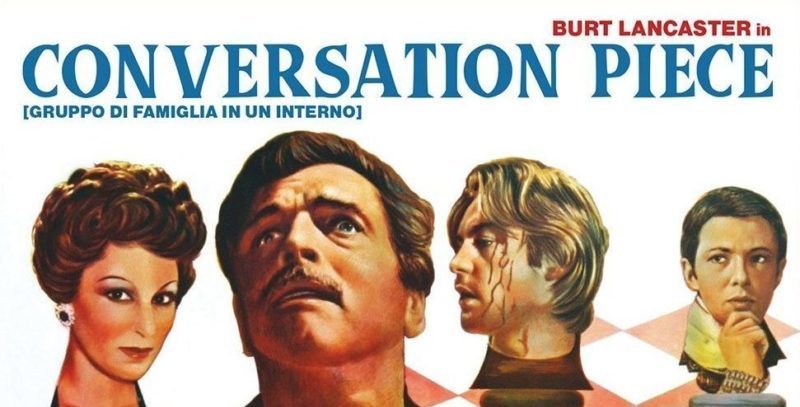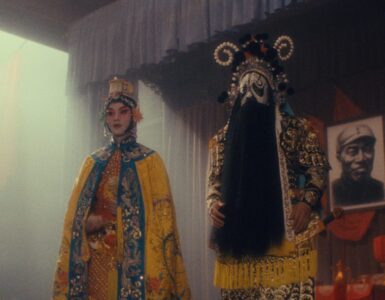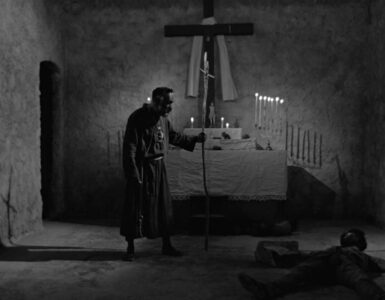
We all, on some level, regret aging because we fear dying, but there’s something especially poignant about watching artists who celebrated vitality grapple with their mortality. It’s one thing to watch Bergman or Woody Allen settle into their later years, having seen them grapple with those subjects their entire careers. It’s quite another when an artist who once seemed to defy death’s grip can no longer avoid it.
Conversation Piece was Luchino Visconti’s penultimate film, released a little more than a year before his death. He was only 67, and had already suffered a stroke. Remarkable in its formal construction, you can nevertheless feel his regrets, his fears, his very life coming to the fore through his protagonist, a retired professor played by Burt Lancaster. So solitary is his existence that he isn’t even given a name. He’s content in his Italian apartment, taking meetings with old friends to discuss cultural matters of the day, occasionally soliciting art dealers for their new acquisitions.
It is in this flurry of activity that he encounters the Marquise Bianca Brumonti (Silvana Mangano). She has no appointment, no proper method of introduction; she simply hopes he’ll rent the upstairs apartment, which he owns but is not presently using. After a great deal of coercion, and the introduction of her young, attractive “family” – lover Konrad (Helmut Berger), daughter Lietta (Claudia Marsani), and daughter’s boyfriend Stefano (Stefano Patrizi) – the professor relents. They may lease it for a year. After that, he’ll have to start using it for its intended purpose and store his overflowing art and books there.
Almost immediately, they start taking advantage of the situation and their landlord’s patience. Unapproved renovations nearly cause it to cave in. They drop in for a visit or a snack as they please. They run up and down the hallways. Their lifestyle invites parties, gangsters, and hangers-on. Yet the professor’s rebukes are only mild and civilized, agitated but far from contemptuous. In fact, he really grows to kind of like the crazy kids.
On our recent Blow-Up episode, I talked about how a lot of older directors looked at the cultural revolution of the 1960s and ‘70s with a sort of cautious envy, at once worried the kids were going too far, yet deeply jealous of the freedoms and advantages they enjoyed. Conversation Piece makes that subtext explicit. Here we have a cultured, sophisticated man, unmarried, and given to indulging in young people who attract him. Visconti himself was born to nobility, never married, and took to relationships with younger men. The professor’s sympathies, in fact, lie strongest with Konrad, played by Visconti’s then-lover Berger. While their relationship remains unconsummated, there’s a strong sexual pull between them almost immediately, Konrad’s vulgarity and anger so surprising the professor that he doesn’t know what to do with the fact that he can’t stop caring for the young man.
All this generational and sexual tension becomes almost too-overt as the film wears on, but if, like me, you’re given to watching films as the reflection of someone’s soul, it’s absolutely mesmerizing. If it’s too urgent, one only senses the urgency of Visconti’s expression, the feeling of needing to get it all out while he still can. Lancaster, who had a unique capacity to open his emotive valve without overplaying the material, proves an ideal conduit through which Visconti can express his own longing. Konrad may take to liking the professor, but he will never take him as seriously as the older man takes him. Youth has a way of making others seem disposable. As one ages, and people fall away, and isolation sets in, relationships become invaluable.
Masters of Cinema brings this odd, enrapturing, personal film to Blu-ray with a transfer from a new 2K restoration that looks very good. Colors are rich and subdued, and there’s no effort to over-sharpen the more distant elements in a given shot. It looks very film-like. The disc comes with the option of the original English audio or an Italian dub track for its release in Italy. Naturally, I recommend going with the English audio.
Eureka’s website mention the only substantial extra being an interview with critic and screenwriter Alessandro Bencivenni, who provides terrific biographical and production context to the film. But the real highlight of the disc is the new hourlong feature “Luchino Visconti: The Quest for the Impossible”, which interviews several of Visconti’s close collaborators about the process of making the film, especially the difficulties he had after the stroke. They even mention that not only did Burt Lancaster commit to the project almost immediately, but that he also signed up as a backup director for insurance purposes. It’s a really worthwhile supplement, the kind you don’t usually get with even so-called “major” home video releases, let alone a mostly-unremarked-upon late Visconti picture.
Remarked upon or no, I watched Conversation Piece several weeks ago, and it’s really stuck with me. It’s a thoughtful, ruminative film that demonstrates the best qualities of a late-in-life filmmaker – certainty, curiosity, urgency, and honesty. Masters of Cinema have done great work bringing it to Blu-ray, with a damned good transfer and illuminative supplements.






![Bergman Island (The Criterion Collection) [Blu-ray]](https://criterioncast.com/wp-content/uploads/2022/11/bergman-island-the-criterion-collection-blu-ray-400x496.jpg)
![This Is Not a Burial, It’s a Resurrection (The Criterion Collection) [Blu-ray]](https://criterioncast.com/wp-content/uploads/2022/11/this-is-not-a-burial-its-a-resurrection-the-criterion-collection-blu-ray-400x496.jpg)
![Lars von Trier's Europe Trilogy (The Criterion Collection) [The Element of Crime/Epidemic/Europa] [Blu-ray]](https://criterioncast.com/wp-content/uploads/2022/11/lars-von-triers-europe-trilogy-the-criterion-collection-the-element-of-400x496.jpg)
![Imitation of Life (The Criterion Collection) [Blu-ray]](https://criterioncast.com/wp-content/uploads/2022/11/imitation-of-life-the-criterion-collection-blu-ray-400x496.jpg)
![The Adventures of Baron Munchausen (The Criterion Collection) [4K UHD]](https://criterioncast.com/wp-content/uploads/2022/11/the-adventures-of-baron-munchausen-the-criterion-collection-4k-uhd-400x496.jpg)
![Cooley High [Criterion Collection] [Blu-ray] [1975]](https://criterioncast.com/wp-content/uploads/2022/11/cooley-high-criterion-collection-blu-ray-1975-400x496.jpg)